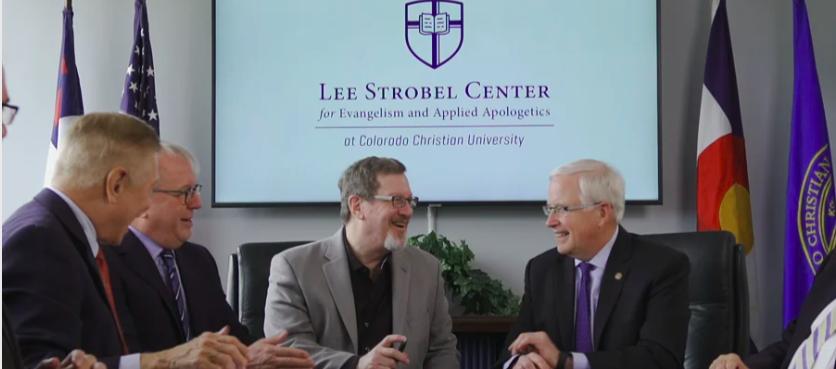What is the next stage in evangelism and apologetics? I recently caught up with Lee Strobel to ask him about his new center for evangelism and apologetics. Check out the brief interview below for some insight as to how he, along with Mark Mittelberg, plan to equip people in the church to naturally share and defend their faith:
SEAN MCDOWELL: With the passing of Billy Graham, many people have been asking who will fill the void. How does the Lee Strobel Center for Evangelism and Applied Apologetics help with this need?
LEE STROBEL: There’s still an important role for mass evangelism, but I believe the foundational way to share Jesus is when contagious Christians build authentic relationships with people far from God and engage in honest conversations about their faith Christ. We want to help churches train their congregations to do just that. So I believe Billy Graham‘s successors are millions of Christians who are equipped and motivated to be stronger salt and brighter light in our increasingly skeptical culture. We want to raise the evangelistic temperature of local churches so they become hotbeds of outreach activity. That means each church will need an evangelism director – either full-time, part-time, or a qualified volunteer – who will work under the direction of the senior pastor to train and organize the congregation to impact their community for Christ. This role is in the spirit of the “office of the evangelist” described in Ephesians 4:11-13. We have a biblical plan to equip and certify these leaders.
MCDOWELL: You have said that this center is one of the most important things you have done in your career. What makes this so vital?
STROBEL: America is becoming increasingly resistant to the historic biblical message. On top of that, a recent survey showed that many young Christians actually think evangelism is a bad idea. My ministry associate Mark Mittelberg and I want to help change the way they view evangelism and revitalize the American church for outreach. We teach a proven six-stage process that, by God’s grace, can reignite the evangelistic effectiveness of churches, even where passion for outreach has grown very dim over the years. As I get older, I want to use the later years of my life in this vitally important mission. I want to drag as many people as I can with me to heaven – and I believe this new Center is my best shot at doing just that.
MCDOWELL: Why did you choose to include in the title, "Evangelism and Applied Apologetics"? What should the relationship be between evangelism and apologetics?
STROBEL: Apologetics without evangelism can quickly turn into a game of head knowledge and academic debate. We want to help Christians not only win philosophical arguments, but also to win people to Christ. Apologetics has been called the handmaiden to evangelism, and I think that’s its key role. Apologetics clears away the obstacles so that a person can make progress toward faith in Jesus – and that is needed more today than ever before. I like to quote our mutual friend J. Warner Wallace, who said evangelism today is spelled A-P-O-L-O-G-E-T-I-C-S. We want to equip churches, ministries, and individual Christians to defend the faith so that they can open up a spiritual pathway and lead people into a life-changing and eternity-altering relationship with Christ.
MCDOWELL: What is your favorite story of how someone came to Christ through one of your books?
STROBEL: Oh, wow. To God’s glory, there are so many. But I think my favorite might be the atheist amateur astronomer in the Chicago suburbs, who went to the bookstore to get the latest science magazine. He picked it up and sat on a couch in the store to read it. But he sat on something – which turned out to be a copy of The Case for Christ. He paged through it and thought, “I don’t believe this stuff,” and threw it down. But then he felt a very distinct urging to pick it up and buy it. He did – and he read it, which led him to commit his life to Christ. This happened right after the book came out more than 20 years ago. He recently wrote me to let me know he’s still a devoted follower of Jesus and part of a church where he has retired in Kentucky.
MCDOWELL: What is one simple step that has worked for you to motivate others to share their faith?
STROBEL: Mittelberg and I portray personal evangelism as the “unexpected adventure.” Most people want some action or adventure in their lives, but that always includes a bit of risk. We find that if Christians will take a risk and make themselves available, God will open up spiritual adventures for them. Of course, the risk isn’t usually as big as they imagined it to be. What’s the worst thing that can happen if we raise a spiritual issue with someone? They might say, “Sorry, I’m not interested.” That’s not a big deal! In some parts of the world, Christians put their lives on the line to talk with others about Jesus. So our souls won’t be crushed if someone politely declines a spiritual conversation or maybe pokes fun of us on social media And the benefits of taking such risks to share the Good News obviously outweigh the costs. That’s why we wrote a six-week devotional on this theme – it’s called The Unexpected Adventure. We find that when Christians read through that book over 42 days, their motivation to share Jesus grows exponentially!
Check out the center here.

